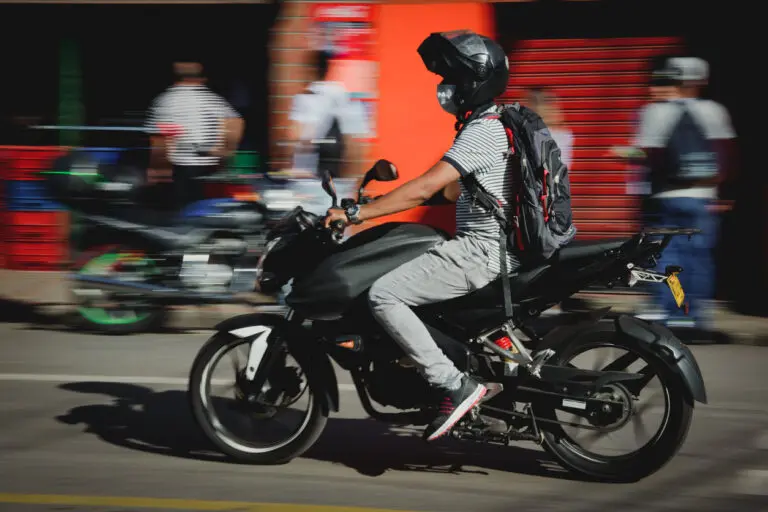
If you ride a motorcycle, you know that navigating through traffic can be challenging. When cars are backed up on a busy highway, it might seem like a good idea to move between lanes to get ahead. This practice—often called lane splitting—may appear to save time or reduce your chances of getting rear-ended in slower traffic.
However, before you consider it, it’s important to know what the law in Texas says and how lane splitting could affect an injury claim if an accident happens. Understanding your rights can help you protect your interests and recover compensation if you’re hurt in a motorcycle accident.
What Is Lane Splitting?
Lane splitting is when a motorcyclist moves between two lanes of traffic, passing vehicles that are moving at a slower pace. This differs from standard riding, where you stay within a single lane.
Some riders believe that lane splitting can reduce congestion and lower the risk of being hit from behind. Others argue that it’s unsafe because drivers may not expect a motorcycle to appear between lanes.
While the idea might seem simple enough, the way courts and lawmakers see lane splitting can vary. Even the terminology can differ. Some states refer to similar practices as “lane sharing” or “lane filtering.” The core idea remains the same: the motorcycle moves through spaces that cars do not usually use, making the rider’s path shorter—at least in theory.
Is Lane Splitting Allowed in Texas?
Every state has its own set of traffic rules. In some places, lane splitting or filtering is allowed under specific conditions. However, Texas law, as it currently stands, does not give motorcyclists the legal right to lane split. The Texas Transportation Code does not include any exception that allows motorcycles to ride between lanes of traffic.
Law enforcement officers, insurance companies, and judges often view lane splitting as unsafe or against the rules unless state law explicitly says otherwise. In Texas, the lack of a legal endorsement means that if you’re involved in a collision while lane splitting, it may complicate any claim you file. Opposing parties might argue that you were not following standard traffic rules and thus share some or all of the fault.
Lane Splitting and Determining Fault For an Accident
If you’re hurt in a motorcycle accident, you may want to file a personal injury claim. This claim can help you recover money for your medical bills, lost wages, and other losses. But to succeed, you need to show that the other party caused the crash. This is where the concept of fault becomes critical.
In a negligence claim, there are four key elements you must prove:
- Duty of care: The other party owed you a duty to act with reasonable care.
- Breach of duty: The other party failed to meet that duty by acting unreasonably.
- Causation: This failure caused the accident.
- Damages: You suffered measurable harm as a result.
Causation has two parts: factual cause and proximate cause. Factual cause is about whether the accident would have happened “but for” the other driver’s actions. Proximate cause is about fairness and foreseeability—whether it makes sense to hold that person legally responsible for the harm.
Lane splitting can affect how these elements are viewed. If you were lane splitting at the time of the crash, an insurance company might argue that you were acting outside the normal flow of traffic, making the accident harder to blame solely on the car driver. Even if the other driver was reckless, your actions could reduce how much you might recover due to comparative negligence rules.
The final outcome depends on the facts, evidence, and how well you can show that the other party’s actions led to your injuries. Proximate cause often boils down to what a judge or jury believes was reasonably predictable given the situation.
Damages You Can Recover After a Motorcycle Accident in Texas
If you establish that another driver’s carelessness caused your injuries, you may be able to recover compensation. The types of damages available in a personal injury case generally fall into two categories: economic and non-economic.
Before listing them, remember that you must first prove your case. If you show that the other party was at fault and that lane splitting did not break the chain of causation, you could request payment for:
- Economic damages that cover direct financial losses, such as medical bills, lost wages, property damage, and future rehabilitation costs.
- Non-economic damages that address more personal harms, such as pain and suffering, emotional distress, loss of enjoyment of life, scarring, and permanent disability.
These damages aim to make you whole again after an accident. Since not all injuries have a price tag, determining the exact value of non-economic damages can be challenging. In many cases, insurance companies and lawyers negotiate to reach a fair settlement that considers both your financial and personal hardships.
Seeking Legal Guidance for Your Motorcycle Accident Claim
While Texas law does not permit lane splitting, that doesn’t mean you automatically lose your right to compensation if you were involved in a crash. Every accident is unique, and the outcome often depends on the specific details of your case. You may need professional legal advice to understand where you stand and how best to move forward.
An experienced personal injury attorney can explain the relevant laws, help gather evidence, and negotiate with the insurance company on your behalf. Attorneys understand how to present your situation in a way that highlights the other party’s negligence. They also know how to counter common arguments used by insurers to lower or deny your claim.
Beyond that, a skilled lawyer can guide you through the concepts of proximate cause and comparative fault. They can show how the other party’s actions—perhaps their careless turn or failure to look in a mirror—led to your injury. This explanation can help ensure that your case is stronger and improve your chances of winning fair compensation.
Contact our Motorcycle Accident Lawyers at McMinn Personal Injury Lawyers for Legal Help With Your Case
If you’ve been injured, contact your nearest McMinn Personal Injury Lawyers location to schedule a free consultation today.
We serve in Austin, TX and Salt Lake City, UT.
McMinn Personal Injury Lawyers – Austin, TX Office
502 W 14th St, Austin, TX 78701
(512) 474-0222
